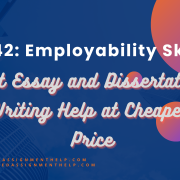This is an individual assignment. It will constitute 100% of your overall mark for the module. Please choose ONE question from the following FOUR. You are asked to write an essay-style answer of 3000 words on the topic you have chosen. Please note the policy on Penalties for Exceeding the Prescribed Word Limit for an Assignment shall apply1
You are expected to develop your own arguments within the assignment, based on your own critical reflection, as well as your wider reading, and the discussions that have taken place during lectures and seminars. You are also expected to draw on academic sources such as journal articles, books to to support the arguments and analysis within your assignment.
You should also make sure that referencing and citing of sources complies with the Harvard Referencing System. A guide for this can be found online via the University of Sunderland Library website.
All students must submit a Turnitin receipt with the paper copy submission. The penalty for students who do not submit their assessed work through Turnitin is that their mark is withheld and the assessment board may deem the work to have failed.
Students may submit drafts through Turnitin prior to submission and generate reports. The last submission prior to the deadline will be deemed to be the final submission for assessment purposes.
This assessment covers the following learning outcomes from the module.
Knowledge:
- Critically review and apply concepts, terminology & theoretical models associated with international business policies and strategies.
- Demonstrate understanding of the political, socio-cultural, economic and technological factors that have been found to influence variations in international organisational business structures and leadership and management styles
- Critically assess the relationship between national and organisational cultures
- Relate the conceptual theories of ‘internationalisation’, innovation and competitive advantage to different industries and locations
Skills:
1. Apply relevant theoretical concepts to real-world business (environment) dilemmas or issues, producing a diagnosis and suggesting possible outcomes.
Assessment Criteria:
For each question, the competent answer will be concise, accurate and clearly written in your own words. It will put forward your individual analysis of the issues raised, rather than merely offer a descriptive account. It will be logically organised and contain a conclusion.
Drawing on what you have learnt during the module, your assignment should apply the theories that are relevant to the assignment question chosen. In addition, your arguments within the assignment should be supported by drawing on relevant academic literature and examples from companies operating in the international business environment,
You also need to make sure that direct quotations are cited and acknowledged in compliance with the Harvard Referencing System.
The Generic PG assessment criteria are attached as well as a module interpretation in the form of a mark sheet.
The University’s Policy on Cheating, Collusion and Plagiarism will apply.
Questions
In answering ONE of these questions, please pay particular attention to the assessment criteria
Please also note that
(i) as much as possible your answers should draw on real world examples from the activities of international businesses and national economies
(ii) equal weighting should be assumed for two part questions.
- In the context of Brexit, and drawing on relevant theory to inform your arguments, set out the advantages and disadvantages of a non-EU major manufacturer relocating production from the UK to another EU Member State to maintain preferential access to the Single European Market.
- Applying your analysis to a specific Multi National Enterprise operating in at least two different countries, critically assess the theories which are available to evaluate the extent and potential impact of political risks to its business operations?
- Drawing on relevant theory, consider what impact the outcomes of the US Presidential elections will have on the Transatlantic Trade and Investment Partnership (TTIP) negotiations, and what the implications are for MNEs from BRIC countries seeking to invest in US and EU markets.
- Critically compare and contrast the activities of two multinational enterprises of your choice in the same industrial sector in developing new technology to maintain their competitive edge.











